“ResearchFlow: Understanding the Knowledge Flow between Academia and Industry” is a conference paper submitted to Knowledge Engineering and Knowledge Management – 22nd International Conference, EKAW 2020. Angelo Salatino, Francesco Osborne, Enrico Motta Abstract Understanding, monitoring, and predicting the flow of knowledge between academia and industry is of critical importance for a variety of stakeholders, including governments, funding […]
Category: Science Of Science
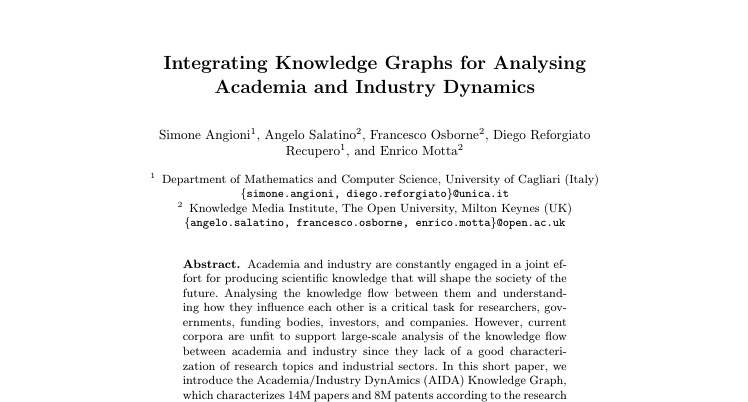
Integrating Knowledge Graphs for Analysing Academia and Industry Dynamics
Academia and industry are constantly engaged in a joint effort for producing scientific knowledge that will shape the society of the future. Analysing the knowledge flow between them and understanding how they influence each other is a critical task for researchers, governments, funding bodies, investors, and companies. However, current corpora are unfit to support large-scale analysis of the knowledge flow between academia and industry since they lack of a good characterization of research topics and industrial sectors. In this short paper, we introduce the Academia/Industry DynAmics (AIDA) Knowledge Graph, which characterizes 14M papers and 8M patents according to the research topics drawn from the Computer Science Ontology. 4M papers and 5M patents are also classified according to the type of the author’s affiliations (academy, industry, or collaborative) and 66 industrial sectors (e.g., automotive, financial, energy, electronics) obtained from DBpedia. AIDA was generated by an automatic pipeline that integrates several knowledge graphs and bibliographic corpora, including Microsoft Academic Graph, Dimensions, English DBpedia, the Computer Science Ontology, and the Global Research Identifier Database.

Academia/Industry DynAmics (AIDA) Knowledge Graph
Academia and industry share a complex, multifaceted, and symbiotic relationship. Analysing the knowledge flow between them, understanding which directions have the biggest potential, and discovering the best strategies to harmonise their efforts is a critical task for several stakeholders. While research publications and patents are an ideal media to analyse this space, current datasets of […]
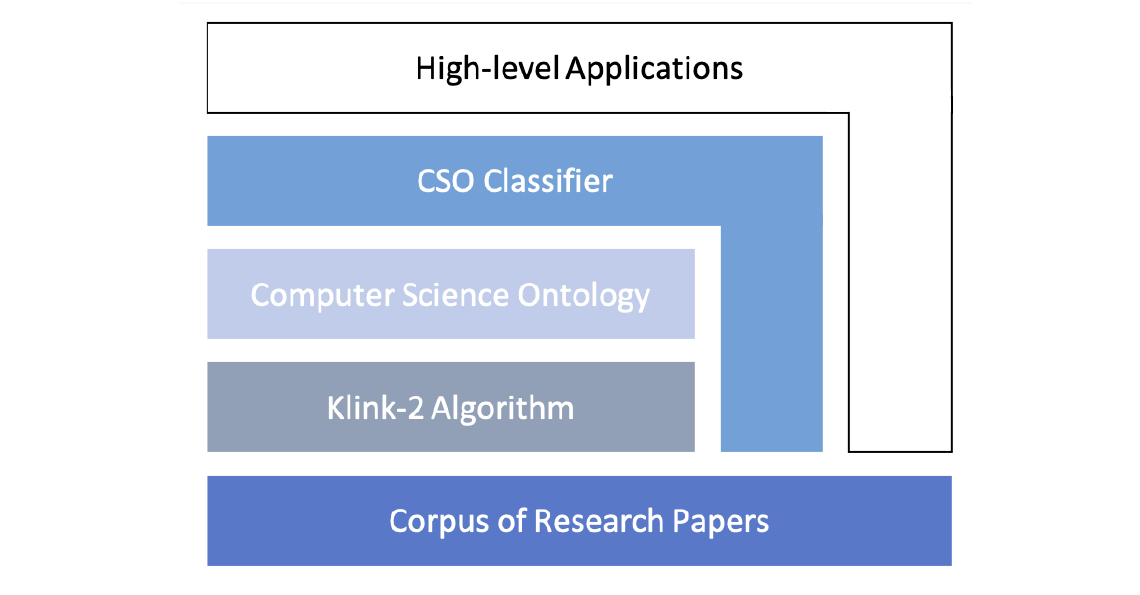
Ontology Extraction and Usage in the Scholarly Knowledge Domain
Ontologies of research areas have been proven to be useful in many application for analysing and making sense of scholarly data. In this chapter, we present the Computer Science Ontology (CSO), which is the largest ontology of research areas in the field of Computer Science, and discuss a number of applications that build on CSO, to support high-level tasks, such as topic classification, metadata extraction, and recommendation of books.
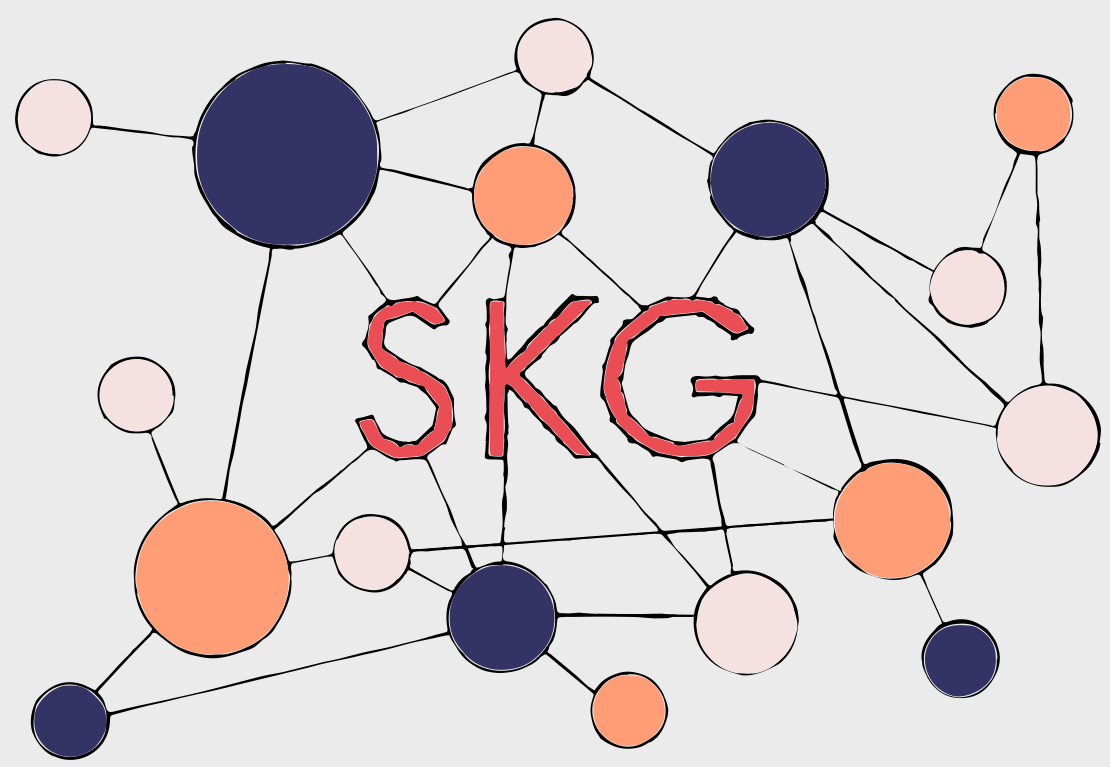
1st Workshop on Scientific Knowledge Graphs (SKG2020)
In the last decade, we experienced an urgent need for a flexible, context-sensitive, fine-grained, and machine-actionable representation of scholarly knowledge and corresponding infrastructures for knowledge curation, publishing and processing. Such technical infrastructures are becoming increasingly popular in representing scholarly knowledge as structured, interlinked, and semantically rich Scholarly Knowledge Graphs (SKG).
The 1st Workshop on Scientific Knowledge Graphs (SKG2020) aims at bringing together researchers and practitioners from different fields (including, but not limited to, Digital Libraries, Information Extraction, Machine Learning, Semantic Web, Knowledge Engineering, Natural Language Processing, Scholarly Communication, and Bibliometrics) in order to explore innovative solutions and ideas for the production and consumption of Scientific Knowledge Graphs (SKGs).
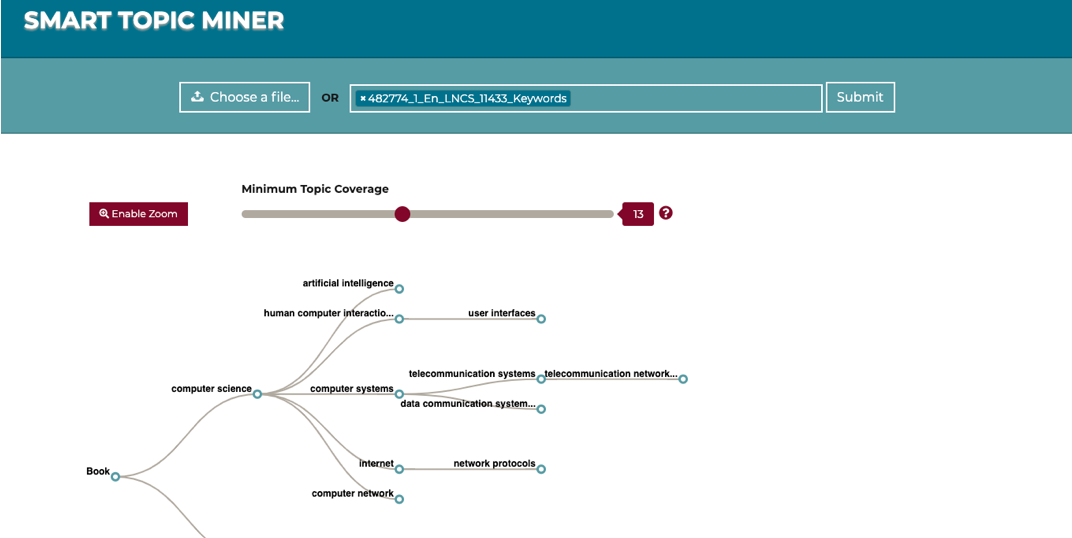
Smart Topics Miner 2: Improving Proceedings Retrievability at Springer Nature
Producing a robust and comprehensive representation of the research topics covered by a scientific publication is a crucial task that has a major impact on its retrievability and consequently on the diffusion of the relevant scientific ideas. Springer Nature, the world’s largest academic book publisher, has typically entrusted this task to the most expert editors, which had to manually analyse new books and produce a list of the most relevant topics. To support Springer Nature in this task, we developed Smart Topic Miner, an application that assists the editorial team in annotating proceedings books according to a large-scale ontology of research areas. Over the past three years, we evolved this application according to the editors’ feedback and developed a new engine, a new interface, and several other functionalities. In this demo paper, we present Smart Topic Miner 2, the most recent version of the tool, which is being regularly utilized by editors in Germany, China, Brazil, and Japan to annotate all book series covering conference proceedings in Computer Science, for a total of about 800 volumes per year.
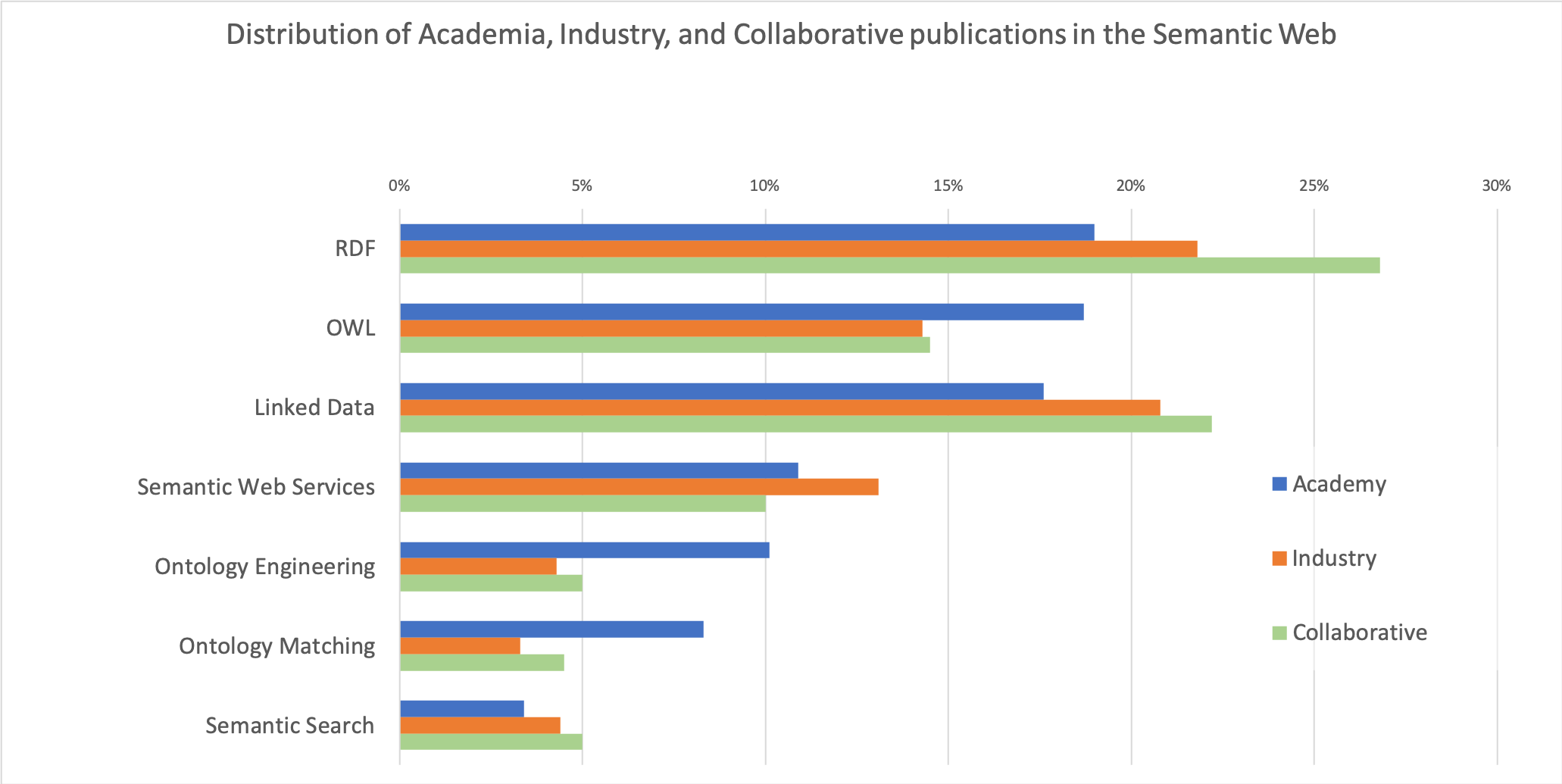
Integrating Knowledge Graphs for Comparing the Scientific Output of Academia and Industry
Analysing the relationship between academia and industry allows us to understand how the knowledge produced by the universities is being adopted and enriched by the industrial sector, and ultimately affects society through the release of relevant products and services. In this paper, we present a preliminary approach to assess and compare the research outputs of academia and industry. This solution integrates data from several knowledge graphs describing scientific articles (Microsoft Academics Graph), research topics (Computer Science Ontology), organizations (Global Research Identifier Database), and types of industry (DBpedia). We focus on the Semantic Web as exemplary field and report several insights regarding the different behaviours of academia and industry, and the types of industries most active in this field.
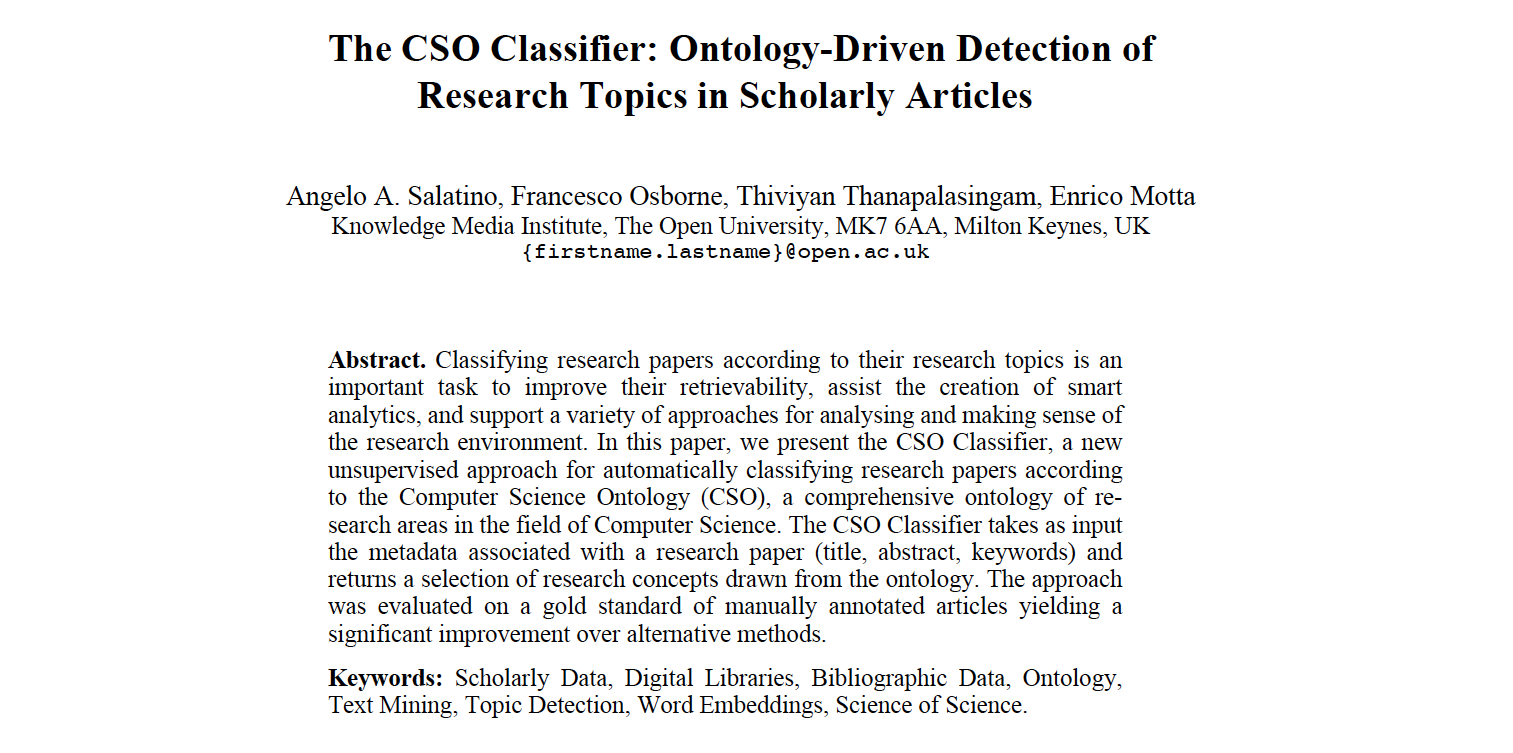
The CSO Classifier: Ontology-Driven Detection of Research Topics in Scholarly Articles
Classifying research papers according to their research topics is an important task to improve their retrievability, assist the creation of smart analytics, and support a variety of approaches for analysing and making sense of the research environment. In this paper, we present the CSO Classifier, a new unsupervised approach for automatically classifying research papers according to the Computer Science Ontology (CSO), a comprehensive ontology of research areas in the field of Computer Science. The CSO Classifier takes as input the metadata associated with a research paper (title, abstract, keywords) and returns a selection of research concepts drawn from the ontology. The approach was evaluated on a gold standard of manually annotated articles yielding a significant improvement over alternative methods.
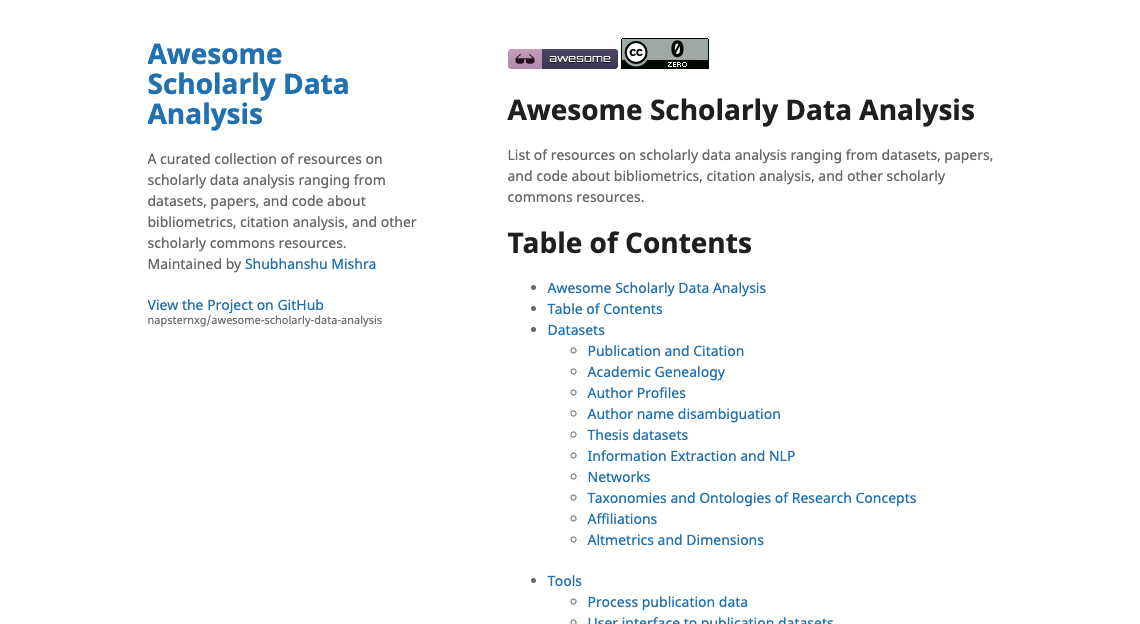
Awesome Scholarly Data Analysis
Awesome Scholarly Data Analysis is a curated collection of resources that can support Scholarly Data analytics. This list ranges from: Datasets, which includes different corpora of papers, citations, authors and others, as well as taxonomies and ontologies of research concepts; Tools for collecting and classifying research papers, information extraction, and visualization; and Venues, Summer Schools, […]
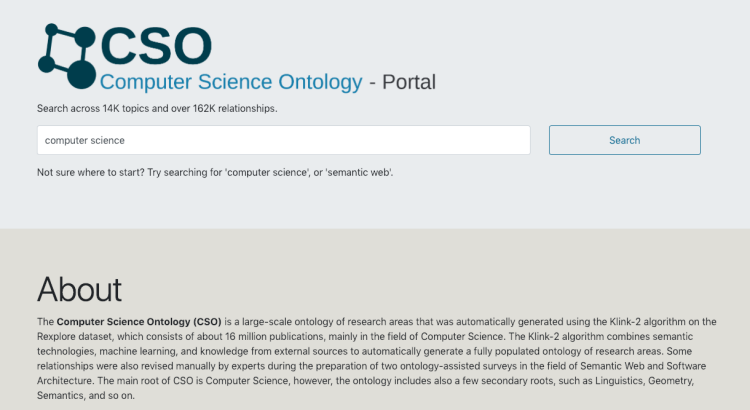
The Open University and Springer Nature launch the Computer Science Ontology
Springer Nature and the Knowledge Media Institute (KMi) of The Open University are partnering to provide a comprehensive Computer Science Ontology (CSO) to a broad range of communities engaged with scholarly data. CSO can be accessed free of charge through the CSO Portal, a web application that enables users to download, explore, and provide feedback on the ontology.



